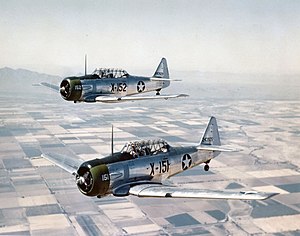North American T-6
| T-6 Texan/SNJ/Harvard | |
|---|---|
 |
|
| USAAF AT-6Cs near Luke Field, 1943 | |
| Role | Trainer aircraft |
| National origin | United States |
| Manufacturer | North American Aviation |
| First flight | 1 April 1935 |
| Retired | 1995 (South African Air Force) |
| Primary users |
United States Army Air Forces United States Navy Royal Air Force Royal Canadian Air Force |
| Number built | 15,495 |
| Developed from | North American NA-16 |
| Variants | North American A-27 |
The North American Aviation T-6 Texan is an American single-engined advanced trainer aircraft used to train pilots of the United States Army Air Forces (USAAF), United States Navy, Royal Air Force, and other air forces of the British Commonwealth during World War II and into the 1970s. Designed by North American Aviation, the T-6 is known by a variety of designations depending on the model and operating air force. The United States Army Air Corps (USAAC) and USAAF designated it as the AT-6, the United States Navy the SNJ, and British Commonwealth air forces the Harvard, the name by which it is best known outside of the US. Starting in 1948, the new United States Air Force (USAF) designated it the T-6, with the USN following in 1962. It remains a popular warbird aircraft used for airshow demonstrations and static displays. It has also been used many times to simulate various Japanese aircraft, including the Mitsubishi A6M Zero in movies depicting World War II in the Pacific.
The Texan originated from the North American NA-16 prototype (first flown on April 1, 1935) which, modified as the NA-26, was submitted as an entry for a USAAC "Basic Combat" aircraft competition in March, 1937. The first model went into production and 180 were supplied to the USAAC as the BC-1 and 400 to the RAF as the Harvard I. The US Navy received 16 modified aircraft, designated the SNJ-1, and a further 61 as the SNJ-2 with a different engine.
...
Wikipedia
